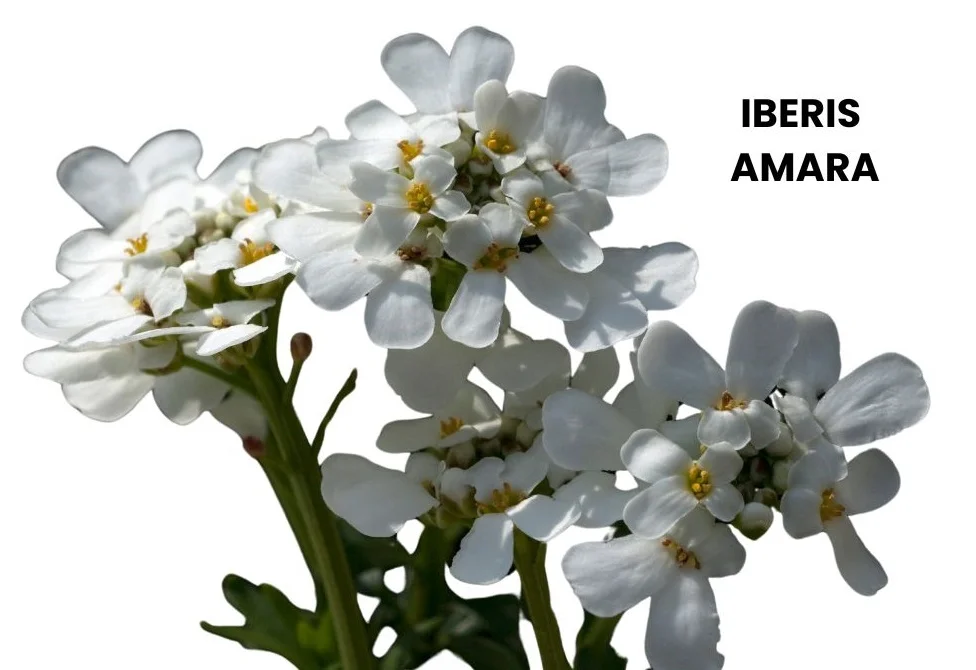Iberis Amara, commonly known as Bitter Candytuft, is a homeopathic remedy primarily used to treat various cardiac conditions and associated symptoms.
This remedy, derived from the plant of the same name, is notable for its ability to alleviate symptoms of nervous excitement and cardiac debility.
It has specific efficacy in addressing heart issues like hypertrophy, palpitations, and cardiac dyspnea, often presenting after illnesses such as influenza.

SOURCE INFORMATION
Scientific Classification
- Kingdom: Plantae
- Order: Brassicales
- Family: Brassicaceae
- Genus: Iberis
- Species: I. amara
Origin
Iberis Amara, or Bitter Candytuft, is native to Europe, particularly in southern and western regions.
The plant thrives in rocky soils and is often found in dry, sunny areas.
It has a long history of medicinal use in herbal traditions, primarily for its stimulating effects on the heart and circulatory system.
Historical Facts
The use of Iberis Amara in homeopathy was introduced as a means to manage cardiac ailments and nervous excitement.
Its benefits in treating heart conditions were documented through clinical provings and patient observations.
Over time, it became an important remedy for addressing both acute and chronic heart issues, especially those involving vascular excitement and cardiac hypertrophy.
DRUG PATHOGENESIS
Iberis Amara acts on the heart and vascular system, providing relief from symptoms related to cardiac conditions such as palpitations, dyspnea, and heart dilation.
It also affects the nervous system, leading to states of nervous excitement and irritability.
KEY CHARACTERISTICS
- Cardiac Symptoms: Consciousness of heart action, irregular and intermittent pulse, stitching and darting pains in the heart, violent palpitations, and cardiac dyspnea.
- Nervous Symptoms: Nervous excitement, irritability, and trembling.
- Digestive Symptoms: Full and painful liver region, white stools.
- Respiratory Symptoms: Constant hawking of thick, stringy mucus, especially in the morning.
DETAILED ORGAN SYMPTOMS
MIND
- Sadness and Frequent Sighing: The patient may experience a low mood and feel the need to sigh frequently.
- Fearful and Trembling: There is often a feeling of fear and trembling, along with irritability.
HEAD
- Vertigo and Heart Pains: Dizziness and vertigo, especially with pains around the heart area.
- Hot, Flushed Face: The face feels hot and flushed, with a sensation of vertigo as if the back part of the head (occiput) were turning around.
- Eye Pressure: A sensation as if the eyes are being forced outwards.
HEART
- Conscious Heartbeats: The patient is very aware of their heartbeats.
- Needle-like Pains: Sharp, stitching pains through the ventricles during each systole, especially noticeable when turning on the left side.
- Palpitations and Vertigo: Palpitations are accompanied by vertigo and a choking sensation in the throat.
- Irregular Pulse: The pulse is full, irregular, and intermittent.
- Cardiac Weight and Pressure: There is a sensation of weight and pressure in the cardiac region with occasional sharp, stinging pains.
- Dropsy (Oedema): Swelling due to fluid accumulation, often with an enlarged heart.
- Violent Palpitations: Palpitations can be triggered by minor exertion, laughing, or coughing.
- Cardiac Dyspnea: Difficulty breathing due to heart problems.
- Heart Dilation: Enlargement of the heart chambers.
- Nocturnal Palpitations: Waking up with palpitations around 2 AM.
- Cough and Red Face: Coughing causes redness of the face.
- Tachycardia: An abnormally fast heart rate.
EXTREMITIES
- Numbness and Tingling: Particularly in the left hand and arm.
- Body Soreness: The whole body feels sore, lame, and trembling.
MODALITIES
- Worse: Lying down, on the left side, with motion, exertion, and in a warm room.
WHAT ARE MODALITIES IN HOMOEOPATHY?
RELATIONSHIP WITH OTHER DRUGS
- Compare with: Cactus (Cact.), Digitalis (Dig.), Amyl Nitrosum (Amyl.), Belladonna (Bell.)
DOSE
- The remedy is used in tincture and first potency forms, depending on the severity and nature of the symptoms.
Frequently Asked Questions
What conditions does Iberis Amara treat?
- It is primarily used for cardiac conditions, including palpitations, cardiac dyspnea, heart dilation, and hypertrophy with thickening of the heart walls.
- It also helps with nervous excitement and associated digestive issues.
How should Iberis Amara be taken?
- It is usually administered in tincture form or in low potencies.
- The dosage and potency depend on the specific symptoms and should be guided by a homeopathic practitioner.
Are there any side effects?
- Homeopathic remedies are generally considered safe when taken as directed.
- However, any new symptoms or aggravation of existing symptoms should be reported to a healthcare provider.
Can Iberis Amara be used for anxiety?
- Yes, it can help alleviate symptoms of nervous excitement and anxiety, particularly when these symptoms are associated with heart conditions.
Glossary of Difficult Words
- Cardiac Dyspnea: Shortness of breath due to heart conditions.
- Hypertrophy: Thickening of the heart muscle.
- Dropsy: Old term for oedema, or swelling due to fluid accumulation.
- Tachycardia: Abnormally fast heart rate.
- Vertigo: Sensation of spinning or dizziness.
- Palpitation: Noticeable, often irregular, heartbeats.
- Borborygmi: Rumbling or gurgling noises produced by the movement of fluid and gas in the intestines.
- Tympanitis: Abdominal bloating.
Iberis Amara is a versatile homeopathic remedy with significant applications in treating cardiac and nervous conditions, providing comprehensive symptom relief, and improving overall patient well-being.
